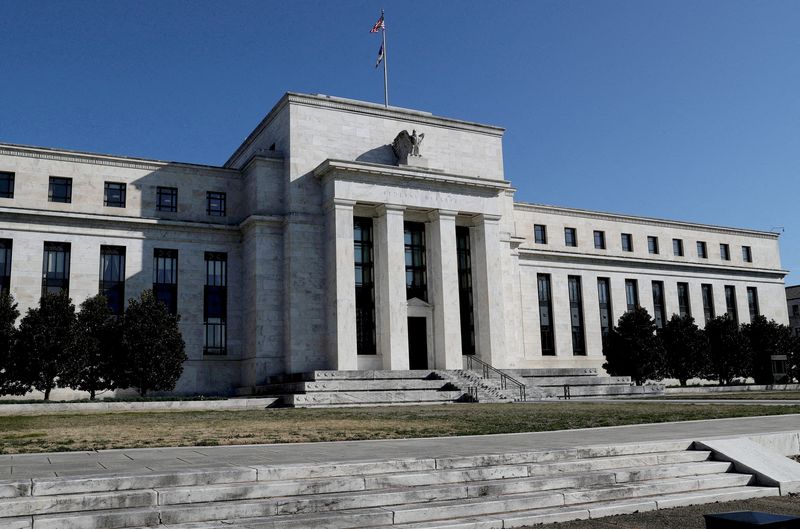By Howard Schneider and Ann Saphir
(Reuters) -Credit conditions for U.S. business and households continued tightening in the first months of the year, according to a Federal Reserve survey of bank loan officers, but the results seemed to mark the accumulating impact of Fed monetary tightening rather than the cliff-like decline in credit some feared after the March collapse of Silicon Valley Bank.
The Fed's quarterly Senior Loan Officer Opinion Survey, or SLOOS, among the first measures of sentiment across the banking sector since the recent run of bank failures, showed a net 46.0% of banks tightened terms of credit for a key category of business loans for medium and large businesses compared with 44.8% in the prior survey in January - a modest, stepwise change.
For small firms, conditions were slightly more stringent with a net 46.7% of banks saying credit terms were stiffer now versus 43.8% in the last survey.
Banks reported that firms of all sizes were showing less demand for credit than three months earlier.
Credit access may be just part of the story, with banks also reporting they were capping loans sizes and raising the cost of borrowing.
On the consumer side, banks said soft demand prevailed again for credit card, automobile and other forms of household credit, although not to the degree seen at the end of last year. Banks on balance showed diminished willingness to provide consumer installment loans, and were also limiting the size of auto loans for example.
"It wasn’t a sea change...The tightening in standards probably wasn’t as severe as one might imagine given the banking stress," wrote J.P. Morgan Chief U.S. Economist Michael Feroli. But the drop in demand, particularly the more than half of banks seeing a drop in small firms wanting to borrow, "appears to paint a grim picture about the outlook."
The tightening also reflected modestly rising concerns among banks about the need to conserve capital and maintain adequate liquidity amid a weaker economic outlook. Mid-sized banks, the Fed said in reporting the survey results, seemed particularly stretched.
"Banks most frequently cited an expected deterioration in the credit quality of their loan portfolios and in customers' collateral values, a reduction in risk tolerance, and concerns about bank funding costs, bank liquidity position, and deposit outflows as reasons for expecting to tighten lending standards over the rest of 2023," the release said. "Mid-sized banks reported concerns about their liquidity positions, deposit outflows, and funding costs more frequently than the largest banks."
ADDED SIGNIFICANCE
The quarterly loan officer survey has taken on particular significance since the failure in early March of Silicon Valley Bank and the ongoing potential for stress among regional banks in general.
The Federal Reserve has been raising interest rates aggressively to control inflation since March of 2022, and a main way that works is by increasing the cost of borrowing money for businesses and households and discouraging major investments and purchases. The impact was felt quickly through things like rising home mortgage rates, and the last three SLOOS surveys, dating to the start of the rate hikes, have shown a rising net share of banks tightening standards.
But policymakers don't want the credit tightening to go so far as to cause a recession.
The Fed had the results of the latest survey in hand at its policy meeting last week, and while officials proceeded with an expected quarter point rate increase they also opened the door to calling it quits - with the effects of a possible credit shock still to be determined.
"The strains that emerged in the banking sector in early March appear to be resulting in even tighter credit conditions for households and businesses," Fed Chair Jerome Powell said in a press conference on Wednesday. "In turn, these tighter credit conditions are likely to weigh on economic activity, hiring, and inflation. The extent of these effects remains uncertain."
Economists expect credit to continue tightening in coming months, with the survey serving as a leading indicator of how bank credit is likely to evolve over time.
The net share of banks tightening commercial loan standards for large and middle-sized firms, for example, rose from 24% for the survey covering the April through June period to 45% for the survey covering roughly the last three months of the year.

Economists who study the SLOOS responses say rising shares of banks tightening standards gradually work their way into slowed economic activity, and can even be a precursor to a downturn.
"Just like Fed hikes, there is a long and variable lag from the impact of tighter lending standards on the economy," Michael Kantrowitz, chief investment strategist with Piper Sandler & Co. wrote on Monday. "This confirmation of tighter lending standards pushes recession odds even higher."